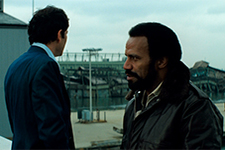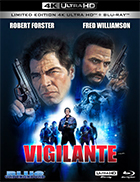Vigilante (4K UHD)
|  By the time that director William Lustig released his second feature Vigilante, there had been so many similarly themed movies about otherwise law-abiding citizens pushed to extralegal justice by rampant crime and an inept court system that it didn’t even feel like a Death Wish (1974) rip-off, but rather just another low-budget exploitation of our primal desires to see justice served. That is both its strength and its weakness, as it clearly demarcates itself from the Charles Bronson mold by focusing more on collective vigilantism rather than a lone wolf trying to right the system, but at the same time such a focus demands more resources than Lustig is ultimately able to deliver. A fantastic pre-credits sequence (which also served as a promotional reel for the film when it was still in production) finds blaxploitation legend Fred Williamson’s Nick rallying a group of citizens in a dark room intercut with the same citizens taking aim at a gun range. This opening scene sets a gritty, unrelenting tone, but also suggests the promise of a whole group of violent citizen-activists prowling the streets for robbers and rapists, when in fact the movie eventually settles on a trio of industrial workers led by Nick. The story’s conscience is Eddie Marino (Robert Forster), a husband and father who takes his family to the park when he isn’t working overtime in order to make ends meet and make good on promises of a Florida vacation. Eddie, who works alongside Nick and his fellow vigilantes but is unaware of their nocturnal activities, is saddled with the requisite dialogue about the proper role of the police and the legal system in maintaining law and order, proclamations that are little more than targets to be later knocked down once Eddie is confronted with a combination of corruption and injustice that allows the gang that murdered his little boy and assaulted his wife to go free. A sleazy defense attorney (played by Joe Spinell, the star of Lustig’s 1980 gorefest Maniac) and a self-serving, lazy judge (Vincent Beck) essentially conspire against the well-meaning, but clearly inadequate assistant district attorney (Carol Lynley) to ensure that the gang leader Rico Melendez (Willie Colón) gets off scot-free. Eddie, in the meantime, has an understandable meltdown in the courtroom, which results in his being sentenced to 30 days in a maximum security prison. This particularly ugly and ironic injustice only hardens his sensibilities, and as soon as he walks out, he heads straight to Nick with nothing but vengeance on his mind. Vigilante was shot entirely in and around the most dilapidated, graffiti-covered, and burnt-out sections of New York City, giving it a gritty, frightening sense of verisimilitude that goes a long way toward balancing some of its more salacious exaggerations and stylistic embellishments (including the John Carpenter-ish synth score). While Walter Hill’s The Warriors (1979) had just a few years earlier presented a similar city-as-hell vision as a kind of cartoonish projection of the near future, Lustig roots his film in the here and now. Like all urban scare movies, Vigilante’s primary goal is to push your fear buttons by depicting the city—once the gleaming bastion of progress—as a cesspool of crime, an unrelenting visualization of society not just crumbling, but crumbled. Drug pushers, pimps, and gangsters prowl the street with authority, while “decent” citizens stay hidden behind locked doors; when Eddie’s wife (Rutanya Alda) is being assaulted in her own backyard in broad daylight, no one replies to her screams. It’s all set up to justify Eddie and the others’ vigilantism, which the movie embraces with little question. Screenwriter Richard Vetere, an accomplished novelist and playwright, jets past moral qualms and cuts right into our most feverish sense of righteousness. He does this primarily by associating the bad guys not with evil, but with a nihilistic void. The film’s climax finds Eddie dangling a villain over a railing, and the villain taunts him by saying, “Go ahead. It don’t mean s--t to me,” to which Eddie responds, “It does to me.” This plays as a kind of answer to an earlier scene in which Eddie dared to ask what would differentiate him from “the scum” if he took the vigilante plunge, to which Nick replied, “That’s something you gotta figure out all by yourself.” Vigilante, with its uncomplicated divide between the nihilistic brutes and the involved citizenry, effectively figures it out for us.
Copyright © 2020 James Kendrick Thoughts? E-mail James Kendrick All images copyright © Blue Underground | |||||||||||||||||||||||||||||
Overall Rating: 

 (2.5)
(2.5)


